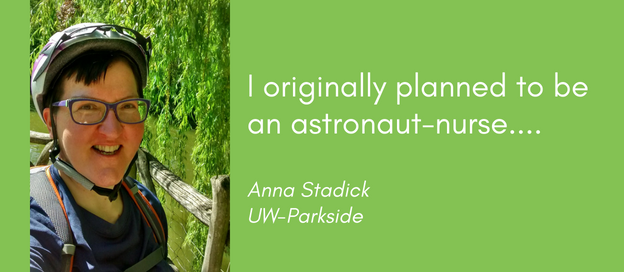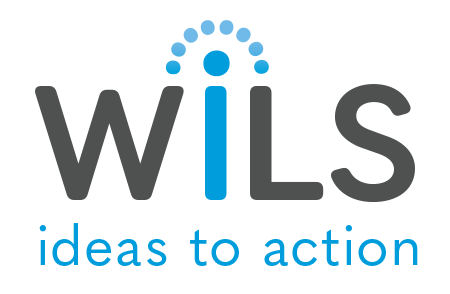
One of our greatest joys at WiLS is hearing our members tell the stories of the big and important work they are doing – interesting new projects or initiatives, or even interesting and new approaches to old projects. And, in addition to hearing about it, it makes us even happier when we can share those stories with other members. Each month, WiLS is proud to feature an interview with one of our library members. This month, we interview Anna Stadick, Library Director at UW-Parkside.
Why did you, personally, choose to work in libraries?
I originally planned to be an astronaut-nurse, which to my three-year-old brain meant fixing people who fell from the moon to the earth. As the number of lunar landings decreased over the late 1970s, it became increasingly clear to me that I needed to find a more viable path. However, I did not begin to work in libraries until about ten years ago. I had studied history and archives and returned to the US after working in the archives of a religious community in Germany. A mentor informed me of UW-Parkside’s search for an archivist and records manager, which seemed like an interesting move. Three years ago, I was named interim library director when the position fell vacant. I interviewed for the position and have been the director here since then.
What appeals to me about archives and libraries is the idea of universal-ish access to information. I want to see everyone find and use accurate, current, and well-documented evidence about whatever they are seeking in the most judgment-free and barrier-free environment possible. Similarly, I want to help create responsible repositories that give artists, scientists, musicians, and authors a real or virtual place where their contribution to culture lives. I enjoy the challenge of keeping those things accessible in terms of adapting to technology and evolving human preferences or processes.
Part of that stems from the experience of library fans everywhere that I share—loving my trips to the library as a child. The library was my portal to the universe where I could pursue eclectic tastes. On a given day, I might have found a promising novel, a book of renaissance art, and directions for turning grain into ethanol. [Doing that successfully earned me a blue ribbon at the 6th grade science fair in those halcyon days when adults encouraged children to distill their own whiskey.]
I want to recreate that kind of experience for everyone in their unique circumstances.
What is unique about the culture of your library? How do you influence it?
For the last three years, library staff cited our work culture as the most positive aspect of working here on annual questionnaires, so I’d like to name positivity itself as a defining aspect of the culture. Credit for that goes, first of all, to my predecessor Jo Cates—currently the Library Director at Rush University Medical Center—who served as director here for about three years. She created an environment where the director invests energy into understanding people and their skills and interests. On that basis, she developed more current position descriptions that served the needs of the library with the input of library staff. At the same time, she supported professional development and accommodation of individual needs whenever possible. People felt appreciated and became more engaged, which translated into a stronger staff community.
I’ve taken that plan and run with it. I have talked to staff members about where they are and want to be; we reevaluate position descriptions often and change things up when people add skills or the needs of the university or students change. When I talk to candidates about a position, I let them know that I will want them to own their responsibility and expertise, and that they will be encouraged to get to know their situation, resources, and challenges and to figure things out as they see fit. Staff members [like all humans everywhere] like personal agency. It enables them to feel invested in the library and their own careers. In particular, new members—fresh out of school or fresh from another job—will bring great ideas along. I’d hate to squelch the possibilities by being overly prescriptive.
When we recognize each staff member’s contributions, the environment becomes both respectful and safe. Staff feels free to express opinions, throw out ideas, argue against each other’s notions, and suggest alternatives. There is just so little drama and so much productive discussion and action.
Finally, I support professional development as much as possible, given budgets and schedules, even or especially if one of us wants to take a step into a new skill or area, to look at something on the fringes of library activity, or wishes to present a project or research. It’s another way staff feel that the library invests in them and their careers. That in turn creates satisfaction, productivity, positivity, neuroplasticity–really so many great things.
What do you think is important to know about the community you work with? What helps you understand their needs?
Students, faculty, staff, community members, and local K-12 students comprise our users, but we focus most intently on current and future students. Knowing their demographic characteristics factors into library decisions about space, hours, services, and collections. Taking the extra step to get to know students personally and work directly with them helps us make decisions that we think have really benefitted our users.
Over half of our students are first-generation students; they are more likely to be under-represented minorities than at any other institution in the UW System and we are second only to the UW-Colleges in terms of the percentage of nontraditional students, that is, older students. Most of our students work long hours to afford their education and many have family responsibilities. That means we need to have librarians that are happy to be champions of our particular students, who appreciate diverse populations, who might have extra patience to explain library and technical processes to a student returning to school after a couple of decades or one who has not had an adequately-funded high school library program. We can’t assume a student in front of us knows the kind of college terms and procedures that we take for granted working in this environment.
What helps us and academic librarians everywhere is working next to students. We hire library and archive student workers and interact with them frequently. There is no position on staff that doesn’t have the opportunity to train students or work alongside them at the desk. There we experience firsthand the time pressures on students, the difficulties of family life, such as an LGBTQ student kicked out of their parental home or one whose parents are suddenly in dire financial circumstances, which affects the student’s access to technology, transportation, hours of work and study, and so much more.
It makes us compassionate. I am repeatedly surprised by how concerned library staff members are for students. Seeing students’ lives inspires us to do whatever the library can to make their education successful, which in turn just encourages us to find ways to make access, instruction, reference, and library housekeeping efficient. It urges us to create library spaces that serve the needs of students looking for a living room, a boardroom, a presentation practice room, a computer lab, and a great place to nap.
We gain further insight into the needs of our students by diving into the school environment of future students. Staff members hold instruction sessions for high school students that come to do research and for grade school and middle school students researching topics for National History Day. We talk with students and teachers about what is available to them and what they learn about research before they come to UW-Parkside, which helps us anticipate freshman needs.
We also ask student workers to serve on library search and screen committees to recruit library personnel. They give us particular insight into what students need from librarians and they get to know something about the kind of preparation and skills library candidates bring to the job.
What big ideas are being worked on at your library? What problems are being solved?
We are working on a lot of the same problems as other libraries—adapting academic library services to an online learning environment, textbook affordability through OER, working with the university to increase recruitment and retention of students as numbers of graduating high school seniors are in a demographic decline.
I’m not sure if this counts as a big idea, but I think our main focus here is solving the difficulties in our students’ lives that I outlined above. There is debate on the role of colleges and universities in intervening in the lives of students. Do we simply provide educational resources, facilities, and assessment or do we provide for the whole life of the student so that their education doesn’t suffer because of any number of life circumstances?
The growing economic divide hurts so many of our students. The library’s ability to provide technology can level the playing field for students and goes hand in hand with our efforts to grow online accessibility. How valuable are our improved online resource access and learning tools if there’s no online? In the United States, 23 % of households don’t have internet access. Some include our students. I’ve been wondering whether we can provide mobile hotspots for checkout, as public libraries have been doing successfully for a few years. Of course, they need the equipment to use these resources, too. We’ve seen much increased use of our laptops for check-out and might need to revise policies on length of loan, for instance.
Solving student problems that affect library use includes student safety. We have been holding active shooter trainings for staff and students and have trained staff in Narcan administration to counter opioid overdose. We have thought about whether the library can play a role in food security for students at risk by helping with a food shelf. We’ve certainly offered more substantial food during finals than the cookies and coffee of past decades precisely because of this concern.
A final student problem that comes to mind is the obstacles that parents face. Our Library Space and Usage Planning Team has relocated our tiny uninspired “lactation room” and created a spacious and comfortably-lit parenting room with a recliner, a changing table and sink, toys for toddlers, and other features. It is near the Guttormsen Family Literacy Lab that houses children’s books for education students, but also for parents who could bring children there for a more relaxed kid-friendly playing and reading environment.
At our small four-year comprehensive university, student problems are visible and challenging. We can’t be agnostic. We have a chance to address them in small but meaningful ways, hopefully without succumbing to mission creep or stretching budgets too thinly. Where does the line between proactive help and mission creep lie? I am still working on that one…
Do you have anything else you’d like to share?
We are celebrating UW-Parkside’s 50 Year Anniversary in the 2018-2019 school year. In that spirit, the library will establish a 1968 room, complete with the furnishings, sounds, art, and newspapers of our founding year. I’d like to usher in weekly Molded Jello Salad Day in that space, but I’m not sure that will fly.
These interviews are part of a series of interviews with both WiLS library and vendor partners. Your feedback is appreciated. If you have any to offer on this article, or suggestions for upcoming interviews, contact Andrea Coffin at acoffin@wils.org.
